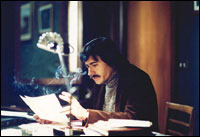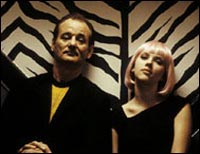Buongiorno, notte
de Marco Bellocchio
Special mention for individual
contribution- Marco Bellocchio
 |
|
|
|
On May 9, 1978, the Italian prime minister
Aldo Moro was kidnapped and killed by the Red Brigades after
55 days of captivity. Written and directed by Italian director,
Marco Bellocchio, Buongiorno, notte tells the story
of this extraordinary episode. Although the film is not an
exact account, it is an evocative portrait of the anni di
piombo or the years of the bullet. Inspired by Il Prigioniero,
The Prisoner, a book written by Anna Laura Braghetti, an ex
member of the terrorist group, also known as la Vivandiera,
the events are seen through the eyes of a young female librarian
and terrorist called Chiara (Maya Sansa). Profoundly politicised
but remorseful, she is opposed to killing the Christian democrat
prime minister. Although Chiara is a fictitious character
and although the real Chiara- la Vivandiera- did nothing to
prevent the murder, Bellochio does suggest the schisms in
the group. The terrorists were in reality divided over the
decision to kill the prime minister. Buongiorno Notte also
describes the actual- and utterly dramatic- circumstances
of Moros captivity. For 55 days, he was kept in a cubby-hole
in an apartment in Rome. Global history is played out in a
microcosmic space. However, Bellocchio is above all interested
in probing the psychology of terrorism. While probing the
Marxist subconscience, he also stresses the religious aspect
of their ideology. The controlled but tense conversations
between the terrorists and Moro are revelatory and gripping.
The contrasting portrait which Bellocchio draws between the
banal family life of the terrorists and their more transgressive
activities is also particularly effective. Robert Herlitzka
is excellent in the role of Aldo Moro. Lucid and brimming
with dignity, it is an interpretation drawn from history.
The terrorists themselves were deeply impressed by Moros conduct.
Although the end- a dream sequence- may be seen as a cop-out,
it deepens the tragic tone and atmosphere of the film. The
music of Pink Floyd and Schubert further accentuates the haunting
mood of the film. Buongiorno Notte is a gripping and highly
relevant political film.
Lost in translation by Sofia
Coppola
| |
 |
|
|
Lost in translation confirms the
considerable talent of Sofia Coppola. At once life-affirming
and melancholic, it is an atypical romantic comedy. Set in
Tokyo, Lost in translation tells the near love story
of Bob Harris, a washed-up American actor- played by Bill
Murray- and Charlotte (Scarlett Johansson), the prematurely
disillusioned young graduate wife of a hip photographer. He
is in Japan to shoot a commercial for Suntory whisky and she
has been left to her own devices while her husband has gone
off to shoot a rock band. Both are guests of the Tokyo Hyatt.
Both are suffering from insomnia. As they explore the bars
and streets of Tokyo together, the unlikely pair form a romantic
friendship. First and foremost, Lost in translation
is hilarious. The central joke is cleverly delivered. With
great perceptivity, Coppola satires a particularly cheesy
sort of commercial to be seen in Japan, the sort which features
bored and sheepish American actors. She gently mocks the stars
collusion in this bizarre form of self-promotion. Bill Murray
perfectly parodies the expressions of American actors in such
commercials- namely, that particular look of false intensity
sported by stars such as Harrison Ford and Kevin Costner.
Lost in translation is an extremely amusing culture
shock comedy. Although the American actor- a little dubiously-
finds Japanese English amusing, I do not consider the film
racist. Coppola satires Americans equally. A giddy starlett
(Anne Faris) is ridiculed by Charlotte and Americans are also
revealed as gloriously inept in confronting Japanese high-tech
appliances. The director and her protagonists are indeed captivated
by the wonders of Tokyo- its energy and surreal hyper-modernity.
Incredibly, Lost in translation risks giving Karaoke-
that very kitsch and all- too-human Japanese invention- an
attractive reputation. Coppola also has an eye for less lighter
cultural differences. In one perfectly observed moment, we
see Charlotte mildly shocked by a commuter reading a pornographic
manga on the subway. A very contemporary comedy of cross-cultural
manners, Lost in translation also offers a refreshing
variation on the conventional older man- younger woman love
story. The film conspicuously rejects Hollywood clichés and
misogynist myths. Bob does not want to influence Charlotte.
He doesnt even sleep with her. Theirs is not an exploitative
relationship. It is also uncommon to see intelligent and world-weary
people search for happiness and love in an American film.
The quality of the acting in Lost in translation is
superb. Scarlett Johansson personnifies youth- in- search-
of - indentity with a sweet sensuality and intelligence. The
film however belongs to Bill Murray. Without over-the-top,
narcissitic excess, he is extraordinarily amusing. In Lost
in translation, he manages to balance romantic engagement
and ironic reticence with devastating dry wit. It is without
a doubt the best role of his career.
|